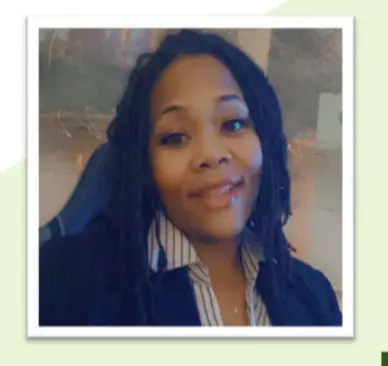
Deanna Watson, CEO of Sudden Changes Corporation
Ph.D. Student, Graduate Class of 2024,
Ph.D. Student, Graduate Class of 2024,
Culturally Hybrid
Identities can inform how a person perceives power, privilege, and oppression. As a researcher, Deanna Watson is culturally hybrid as she understands the perception of the word of God in her life and how others can learn how to understand His plans for them. She has interacted with individuals from multiple socioeconomic statuses, allowing her to adapt to others. She understands that not everyone will have the same ability to understand things the same way, which allows her to be culturally hybrid. Deanna has been inclined to disclose her positionality to maintain ethics, credibility, morale, and authenticity. Deanna is a researcher and a passionate child of God concerned with the issues that impact marginalized communities.
Her positionality refers to being a researcher who understands overlapping identities through intersectionality to culturally ascribe through transparency of understanding how others think as it relates to their behavior. Understanding the position of others primarily allows the intervention of God’s word to be cultivated into the lives of others. In addition, she maintains explicit reflexivity of self-consciousness awareness; the acceptance of ‘the other’ positionality; and the repeated continuation of self-analysis through prayer and supplications made to God. Preconceived notions of beliefs, ascribed influences, and philosophical assumptions shape positionality. Deanna always clarifies by disclosing her positionality to provide validity, impartiality, and balance.
Deanna is a 40-year-old female who identifies as an African American. She grew up in a poverty-stricken urban community in Chicago, Illinois. Fundamentally, enduring many adversities and had oppression narratives through direct experience and observations, including but not limited to intervention narratives where she intervened when observing or experiencing oppression. Oppression narratives are grand because they allow the individual to see the progress made to overcome oppression from a victim to a victor. However, it is equally essential to be able to discuss intervention narratives that stopped, prevented, and intervened when acts of oppression were being observed or experienced. Understanding both oppression and black privilege is something that resonates with her. Essentially, her positionality allows her to be culturally hybrid to ascribe and accept the sensitivities of ‘the other’ positionality by providing explicit reflexivity of self-scrutiny and the repeated continuation of self-analysis, specifically, from the lenses of herself enduring marginalization, oppression narratives of other individuals and being a child of God.
Opposing Positionality
Subsequently, her positionality opposes the positionality of those that maintain power, privilege, oppression, and disparities in society by the way they ignore it, choose not to identify as privileged, decide not to help in creating change (doing nothing) to influence the people they know that maintain privilege in society and individuals that continue to uphold a capitalist society. Indeed, racism is going extinct, and the fall of capitalism is inevitable. Many would ask why racism is going extinct. “Racism is going extinct due to increased…” Please tune into the podcast to hear some fantastic discussions surrounding these issues.
Attenuating to her positionality is that oppressed people are minority voices that are silenced and unheard. Advocating for the voiceless is one of her goals. The word of God tells us in Proverbs 21:13 that Whoever shuts their ears to the cry of the poor will also cry out and not be answered. Suppose society is to change and allow for the liberation of those marginalized. In that case, researchers need to understand the approaches of the psychology of those who maintain the need always to want to control the voices of minorities. Some psychological approaches should be eradicated and replaced with psychology, enabling minority voices for liberation and empowerment. Understanding the positionality of ‘the other’ allows for discovering new psychological approaches to be adapted into society. Change needs to occur by dismantling the continued implementation of principles, theories, and techniques that have kept minorities marginalized. Principals include gentrification, educational de facto residential segregation (new colonialism), and many others. James 1:17 Every perfect gift is from above, coming down from the Father of the heavenly lights, who does not change like shifting shadows. God loves us, and he wants the best for us. He died so that we can live a life of abundance, not for us to be marginalized.
For this reason, many have adopted perspectives of faulty pseudo-scientific premises, such as eugenics, which is an inaccurate pseudo-scientific theory that humans can be improved through the selective breeding of populations. It is the misappropriation of methods such as involuntary sterilization, also called racial cleansing, segregation, and social exclusion, that would rid society of individuals deemed by them to be unfit. Eugenics has disadvantaged those marginalized. Deanna have been transparent to the voices of ‘the other’ the oppressed, including ‘the other’ as the oppressor she oppose as it requires an understanding of the opposition to facilitate change in ideologies. Some continue to be transparent to ideologies that continue to bandage and mask the voices of those marginalized. However, as a researcher, understanding the positionality of ‘the other’ shapes her interpretation to report the facts of their support on issues such as racial de facto segregation, inequality, inequity, and disparities in America. Deanna must analyze the data through ‘the other’ perspective, not just her own. This allows future outlets of opportunity that would allow her and others to dismantle outdated psychological approaches that have protected the continued rise of power, privilege, oppression, and disparities of minority voices in society and birth minority ‘voices’ from being voiceless into liberation and empowerment.
Discussions will include widespread issues with resolutions that can enable change.

Questions to Blogs Can be Discussed during @Laws, Life & Health: Let’s Talk About It!!! Podcast Everyday @7pm (closed Wednesday & Saturday)
Deanna Watson, CEO of Sudden Changes Corporation
Ph.D. Student, Class of 2024, Chicago, IL





